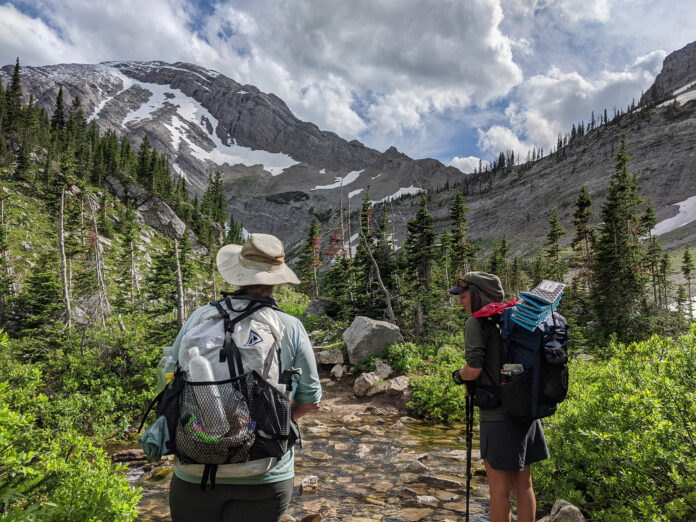Backpacking is more than just a form of travel; it’s an immersive experience that allows you to connect with nature, challenge yourself physically and mentally, and uniquely discover the world. Whether you’re a seasoned outdoor enthusiast or a novice adventurer, backpacking offers a sense of freedom and exploration like no other.
Benefits of Backpacking
Physical Health Benefits
Engaging in backpacking activities provides an excellent workout for your body. Hiking with a loaded backpack strengthens muscles, improves cardiovascular health, and enhances endurance. It’s a great way to stay active and fit while enjoying the beauty of the outdoors.
Mental Health Benefits
The tranquillity of nature and the physical exertion involved in backpacking can have profound effects on mental well-being. Being surrounded by natural beauty reduces stress, promotes relaxation, and boosts mood. Backpacking also fosters a sense of accomplishment and self-confidence as you overcome challenges on the trail.
Essential Gear for Backpacking
Before embarking on a backpacking adventure, it’s crucial to have the right gear. Here are some essential items every backpacker should have:
- Backpack: Choose a comfortable, properly fitting backpack with enough capacity to carry all your gear.
- Tent and Sleeping Bag: Invest in lightweight, durable camping gear to ensure a comfortable night’s sleep.
- Cooking Equipment: Pack a portable stove, cookware, and utensils for preparing meals on the trail.
- Clothing: Dress in layers and opt for moisture-wicking fabrics to stay comfortable in various weather conditions.
Choosing the Right Destination
Selecting the perfect backpacking destination depends on your experience level and personal preferences. Beginners may opt for well-marked trails with moderate terrain, while experienced backpackers might seek out remote wilderness areas for a greater challenge.
Planning and Preparation
Proper planning and preparation are essential for a successful backpacking trip. Research your chosen route, pack carefully, and familiarize yourself with safety procedures. Pay attention to weather forecasts and trail conditions to ensure a safe and enjoyable journey.
Navigating Trails and Terrain
Navigating trails and terrain requires a combination of map reading skills, navigational tools, and environmental awareness. Learn how to read maps, use GPS devices, and interpret trail markers to stay on course. Be prepared for varying terrain and terrain conditions, from rocky mountainsides to dense forests.
Embracing Minimalism and Sustainability
When backpacking, less is often more. Pack only the essentials and leave unnecessary items behind to minimize your environmental impact and reduce strain on your body. Follow Leave No Trace principles, practice eco-friendly habits, and strive to leave the wilderness as you find it.
Nutrition and Hydration
Maintaining proper nutrition and hydration is crucial for staying energized and healthy on the trail. Plan nutritious meals that are lightweight and easy to prepare, and pack plenty of snacks to fuel your adventures. Stay hydrated by drinking water regularly and purifying water from natural sources.
Tips for a Successful Backpacking Trip
Flexibility is key when backpacking. Be prepared to adapt to changing conditions, adjust your plans as needed, and embrace the unexpected. Manage your expectations, focus on enjoying the journey rather than reaching a specific destination, and savour the moments of awe and wonder that nature provides.
Safety Tips and Emergency Preparedness
Safety should always be a top priority when backpacking. Carry a well-stocked first aid kit, stay informed about potential hazards, and be prepared to handle emergencies. Stay vigilant about weather conditions, avoid risky behaviour, and prioritize communication with loved ones back home.
Connecting with Nature
Backpacking offers a unique opportunity to connect with the natural world on a deeper level. Practice mindfulness, take time to appreciate the beauty around you, and immerse yourself in the sights, sounds, and smells of the wilderness. Respect wildlife and tread lightly to minimize your impact on the environment.
Solo Backpacking vs. Group Backpacking
Both solo and group backpacking have their advantages and challenges. Solo backpack offers solitude and self-reliance but requires extra precautions for safety. Group backpacking provides companionship and shared experiences but requires coordination and compromise. Choose the option that aligns best with your preferences and comfort level.
Overcoming Challenges on the Trail
Backpacking is not without its challenges, but overcoming obstacles can be immensely rewarding. Cultivate mental resilience, push through physical fatigue, and draw strength from the beauty and serenity of nature. Embrace the journey, learn from setbacks, and celebrate your achievements along the way.
Conclusion
Backpacking is a transformative experience that offers adventure, self-discovery, and connection with the natural world. Whether you’re embarking on a weekend excursion or a multi-day trek, the rewards of the backpack are unparalleled. So grab your gear, lace up your boots, and set out on your next backpacking adventure—it’s waiting for you.




